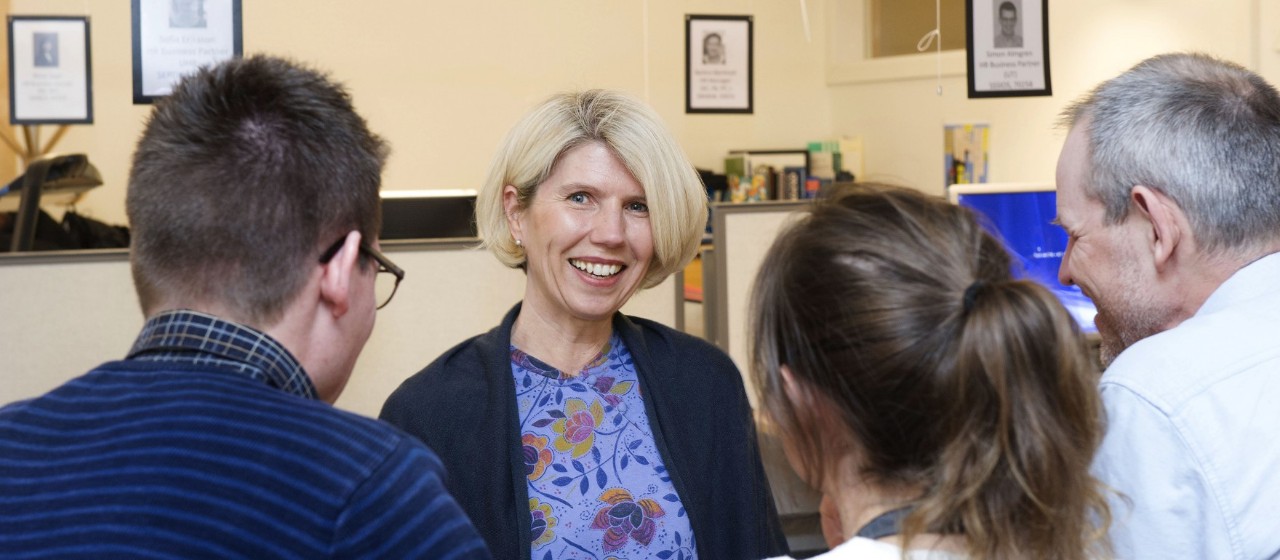
Jenny’s creative journey of knowledge
21 JUNE 2016
As the newly appointed head of HR Support at Research and Development, Jenny Kron Kylefors has once again challenged the limits of her knowledge. With her extensive interests, Jenny’s choice of career has never been obvious.
Throughout her time at school, Jenny found Swedish, English and mathematics easy, but was unable to focus fully on her school work. She found it more fun to hang around with her friends and play in the punk band they formed in high school. As a result, her grades varied somewhat.
“I’ve always been really interested in the Swedish language. In fact, the humanities in general. My parents were teachers, so the choice was obvious. But after two years at teacher training college, her interest in technology beckoned, and she switched to physics. Now Jenny had made a real mistake – at least that was what her former high school Swedish and English teacher told her mother.
Trained physicist
Quite the contrary, as things would turn out, and Jenny took an MSc in theoretical physics at the Institute of Technology at Linköping University. Her sights were then set on further doctoral studies at KTH Royal Institute of Technology, and with her broad education in physics, Jenny had two research options: material-related process technology or optimised snow clearing.
“As a physicist you cover a lot of areas, and it was not a given that the choice would be materials engineering.” But that’s what she chose.
As a young materials engineering postgraduate, Jenny was recruited by Scania in 2004 as a specialist in cast iron for cylinder blocks and cylinder heads, among other things.
“After four years I felt that I didn’t have any more to give within the field, and considered leaving Scania to work with people instead.”
Progresses to manager
The year was 2008 and Jenny told her manager of her plans to start studying psychology. “Psychology and people. In that case you are absolutely cut out to be a manager. I think you would be a good manager. It’s all about psychology,” her manager said.
“I was still interested in technology and also realised I would be financially better off becoming a manager rather than building a mountain of student debt.”
Jenny then became manager of what she describes as a “fantastic group” within materials engineering, with eight PhDs, a couple of graduate engineers and research students.
“It was great fun being a manager. We were a visionary team who formulated and realised objectives within exciting new areas of technology, such as biofuels and exhaust gas chemistry. A group like this involves different challenges for a manager compared to many other similar assignments. You have to constantly stimulate people with fantastic ability and potential. The motto was that it had to be fun and exciting to come to work, and it really was!”
She was head of this group for six years.
“When I started at materials engineering, everyone specialised in different areas. I created dynamic and effective teams and we started to work as a collective.”
Moves to HR section
The idea of starting to work with Human Resources came to Jenny when she was interviewed for the manager’s job at Materials Engineering by an HR manager at Research and Development.
“I thought at the time, I want her job. That thought stayed with me for six years while I was manager, and I often thought about applying to HR. At the same time, I am a bit cautious, and I decided instead to gradually reduce the technological content of my work, with the aim being to end up in HR. But then a temporary post became available and I applied for and got it.”
The work was everything Jenny had hoped it would be.
“In my world, the HR manager is an esteemed person. It’s a job that requires people’s confidence in you. Even if you don’t have direct control, you have a lot of influence. Previously, people talked about personnel administration, but now we understand that HR has an important strategic role. What is required to attract and retain talent? How can Research and Development be better at diversity and ensure that the skills of all employees are exploited? The pleasure comes from moving between both everyday HR work and the strategic level.”
“In the future, we will need more expertise in systems engineering, computer engineering and mechatronics, among other things, to develop self-driving vehicles and the services of the future. And in these student groups, there are many people who have not even realised that Scania will be a major employer for them.”
A condensate of challenges
While rehabilitation issues dominate HR work within production, recruitment is the major factor in Research and Development. But not everything is strategy and recruitment for an HR manager – everyday thorny personnel issues come knocking on the door constantly.
“This job is so interesting. You never cease to be amazed at human behaviour. Here we really do get a condensate of challenges. And we can make a difference. That’s a big part of our raison d’être. For the individual manager, specific personnel issues can become very challenging. We have to help managers handle these challenges and so become better managers.”
History suggests that this will probably not be the final career change for Jenny, even if she does describe this as her dream job.
“I’ve got many reactions to my change of job – from those that wonder why I want to get mixed up in HR issues, to those that think it’s cool. I think that here in HR we need both people with training in behavioural sciences and labour law and people with experience of the operations and leadership side, like myself. I really look forward to this job and I’ve been lucky enough to get the chance to lead another fantastically competent gang!”